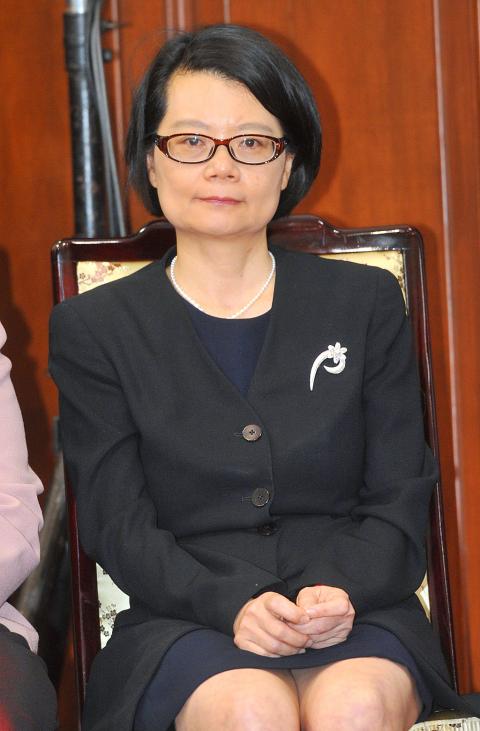Wang Mei-yu (王美玉), president of Chinese-language newspaper the China Times, was appointed to a six-year term as a Control Yuan member yesterday, the first acting media professional to be tapped for the job.
The Presidential Office yesterday unveiled its list of 29 members of the fifth-term Control Yuan. It was the second time President Ma Ying-jeou (馬英九) has made the appointments during his presidency.
Wang was the third veteran journalist appointed to the position, following Huang Chao-heng (黃肇珩), who was general manager of Cheng Chung Book Co when nominated in 1993, and incumbent Control Yuan member Wu Feng-shan (吳豐山), who was previously a minister without portfolio.

Photo: Liu Hsin-de, Taipei Times
“My 32-year career in journalism came to an end today,” Wang said.
Wang said she accepted the nomination and immediately resigned as president of the China Times, part of the Want Want China Times Group (旺旺中時集團) owned by Tsai Eng-meng (蔡衍明).
Democratic Progressive Party Legislator Huang Wei-cher (黃偉哲) yesterday questioned Wang’s qualifications for the position.
“A member of the Control Yuan must be above partisanship and apolitical, but Wang has long worked with a media outlet that holds strong political views,” he said.
Among the 29 nominees, including Election Commission Chairperson Chang Po-ya (張博雅) being appointed president of the Control Yuan and former Council of Indigenous Peoples minister Sun Ta-chuan (孫大川) being nominated as vice president, only seven were incumbent members.
Liao Pen-chuan (廖本全), an associate professor at National Taipei University’s Department of Real Estate and Built Environment, was disappointed with the appointment of Shih Hung-chih (施鴻志), a retired professor of urban planning, because of Shih’s record handling controversial land expropriations.
Shih had demanded that reporters be excluded from a review of the Taoyuan Aerotropolis, one of the government’s flagship urban renewal projects that covers more than 3,000 hectares of land and affects more than 7,000 households, last year when he chaired a meeting as a member of the Ministry of the Interior’s urban planning commission.
The reason Shih then cited for the ejection order was that public interest was not a factor being considered by the commission.
As a professional expert whom the government has long consulted with on urban renewal and planning issues over the years, Shih has overlooked the importance of public participation in the decisionmaking process, Liao said.
The way he handled the review of the Taoyuan Aerotropolis project showed Shih disregarded the values of democracy, human rights, justice and sustainability, which are all vital to ensure that such projects are in the best interests of the public, Liao said.
With the departure of Control Yuan members Ma Yi-kung (馬以工), Liu Yuh-san (劉玉山) and Huang Huang-hsiung (黃煌雄), who have identified several major flaws in land expropriation cases over the years, and the appointment of Shih, the only candidate among the 29 with a background in urban planning, people facing eviction from their homes as urban renewal efforts mushroom could be left helpless when they turn to the Control Yuan for help, Liao said.

NATIONAL SECURITY THREAT: An official said that Guan Guan’s comments had gone beyond the threshold of free speech, as she advocated for the destruction of the ROC China-born media influencer Guan Guan’s (關關) residency permit has been revoked for repeatedly posting pro-China content that threatens national security, the National Immigration Agency said yesterday. Guan Guan has said many controversial things in her videos posted to Douyin (抖音), including “the red flag will soon be painted all over Taiwan” and “Taiwan is an inseparable part of China,” while expressing hope for expedited “reunification.” The agency received multiple reports alleging that Guan Guan had advocated for armed reunification last year. After investigating, the agency last month issued a notice requiring her to appear and account for her actions. Guan Guan appeared as required,

A strong cold air mass is expected to arrive tonight, bringing a change in weather and a drop in temperature, the Central Weather Administration (CWA) said. The coldest time would be early on Thursday morning, with temperatures in some areas dipping as low as 8°C, it said. Daytime highs yesterday were 22°C to 24°C in northern and eastern Taiwan, and about 25°C to 28°C in the central and southern regions, it said. However, nighttime lows would dip to about 15°C to 16°C in central and northern Taiwan as well as the northeast, and 17°C to 19°C elsewhere, it said. Tropical Storm Nokaen, currently

‘NATO-PLUS’: ‘Our strategic partners in the Indo-Pacific are facing increasing aggression by the Chinese Communist Party,’ US Representative Rob Wittman said The US House of Representatives on Monday released its version of the Consolidated Appropriations Act, which includes US$1.15 billion to support security cooperation with Taiwan. The omnibus act, covering US$1.2 trillion of spending, allocates US$1 billion for the Taiwan Security Cooperation Initiative, as well as US$150 million for the replacement of defense articles and reimbursement of defense services provided to Taiwan. The fund allocations were based on the US National Defense Authorization Act for fiscal 2026 that was passed by the US Congress last month and authorized up to US$1 billion to the US Defense Security Cooperation Agency in support of the

PAPERS, PLEASE: The gang exploited the high value of the passports, selling them at inflated prices to Chinese buyers, who would treat them as ‘invisibility cloaks’ The Yilan District Court has handed four members of a syndicate prison terms ranging from one year and two months to two years and two months for their involvement in a scheme to purchase Taiwanese passports and resell them abroad at a massive markup. A Chinese human smuggling syndicate purchased Taiwanese passports through local criminal networks, exploiting the passports’ visa-free travel privileges to turn a profit of more than 20 times the original price, the court said. Such criminal organizations enable people to impersonate Taiwanese when entering and exiting Taiwan and other countries, undermining social order and the credibility of the nation’s